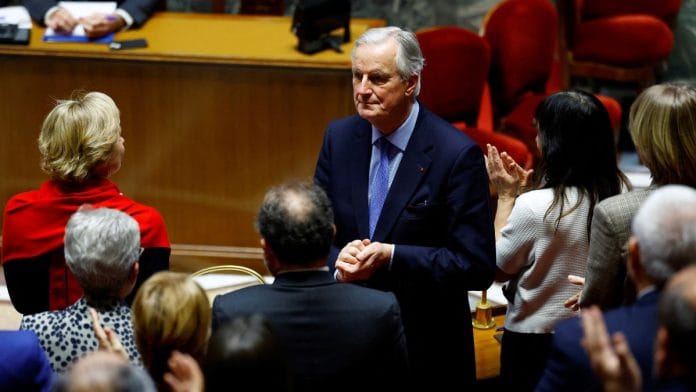New Delhi: A no-confidence motion in the French parliament led to the fall of Prime Minister Michel Barnier’s government Wednesday. Barnier, France’s oldest prime minister, made history—serving the shortest tenure of any French Prime Minister since 1958.
Barnier was appointed head of a minority government by French President Emmanuel Macron on 5 September, 2024, following the snap general elections held in July. He is credited with leading the European Union’s negotiating team for the UK’s exit from the multilateral regional bloc between 2016 and 2021.
The no-confidence resolution Wednesday saw 331 of the 577 members in the National Assembly vote in favour.
Barnier invoked Article 49.3 of the French constitution to pass the 2025 budget without a vote, exposing his government to a no-confidence motion. The Far Right and Left joined together to vote out Barnier.
This is the first time since 1962 that a French premier has lost a no-confidence vote in the National Assembly.
Barnier is expected to submit his resignation to Macron, following which he may continue as a caretaker prime minister till the French president appoints a successor.
Barnier’s budget included several new tax proposals aimed at increasing France’s revenue by EUR 60 billion and reducing the fiscal deficit from 6.1 percent of the Gross Domestic Product (GDP) to around 5 percent. Paris has faced backlash from the European Union as well as the markets over its ballooning fiscal deficits post the COVID-19 pandemic.
The proposed increase in taxes in the budget was highly unpopular, and so was the prime minister, given that the former Brexit negotiator was appointed prime minister by Macron, in a fractured National Assembly. The election results from 8 July saw the formation of three distinct blocs, the Centre, the Left, and the Far Right, with none of the blocs gaining a governing majority.
Barnier’s selection ignored Nouveau Front populaire (New Popular Front or the NFP), the coalition of Left parties, which had won the largest number of seats—182 seats out of 577—but fell short of a majority. Macron’s centrist bloc Ensemble (Together) finished with 168 seats, while the Far Right led by Marine Le Pen’s Rassemblement National (National Rally) finished third with 143 seats.
The snap elections in June were called by President Macron as a knee-jerk reaction to the results of the European elections where the Far Right won the highest share of votes—31.5 percent—far ahead of the Left or the Centre.
Also Read: 150 translated titles, poetry, music—new campaign familiarising Indians with French literature
What happens next?
According to Article 50 of the French Constitution, the Prime Minister “shall” resign on behalf of the government before the president in the event of passage of a no-confidence vote. Barnier is expected to tender his resignation Thursday.
However, Barnier and his council of ministers are expected to continue in a caretaker capacity. In France, this indicates the normal running of government, however, no new political decisions or enshrining of new rights and duties will be carried out by the caretaker administration.
The fall of Barnier’s government means that France does not have a budget for the upcoming year. With the no-confidence motion passing, the budget passed by Barnier’s government is no longer approved.
General elections cannot be called in France till at least 8 July 2025, according to Article 12 of the constitution, leaving Macron no room to dissolve the National Assembly. The budget has to be passed before the end of this year for it to come into effect in 2025.
This leaves the French President with four options.
First, Macron could cave into the Far-Right’s demands concerning the budget, name a new prime minister, and have it passed by the National Assembly before the end of this month as part of a scenario to break the current impasse.
The power to appoint the next prime minister resides with President Macron, however, any nominee would find it difficult to maintain sufficient numbers to govern the country given that no party or bloc has secured majority seats in the Assembly.
Second, according to Article 47 of the constitution, the caretaker government could ask the National Assembly for “authorisation” to collect taxes and by decree make the funds available for expenditure. This would allow Barnier’s potential caretaker government to push for a resolution to continue the provisions of the 2024 budget until a new prime minister is appointed.
The problem with this situation is that France’s goal of reducing its fiscal deficit, will not happen till a new budget is passed, nor will the proposed tax increase be implemented. The rising debt burden of France along with the political crisis has spooked the markets, with French borrowing costs pushed higher than Greece for the first time earlier this week. Greece was hit by a crisis over its high debt-to-GDP ratio over a decade ago as a part of the Eurozone crisis. However, today it stands as a more attractive investment opportunity than France.
The third option is for the caretaker government to pass the budget through an executive order. However, this charts a path of legal uncertainty given that it is unclear whether caretaker governments can use such powers.
The other option is for Macron to resign, leading to new elections across the country. While 2024 is the third of the President’s second five-year term, he has so far refused to resign from his post, claiming that the French people have elected him twice to serve them.
(Edited by Shivani Mago)
Also Read: Two documents, Modi-Macron visits—India-France defence partnership is touching new heights






